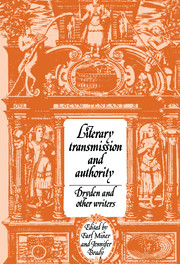Book contents
- Frontmatter
- Contents
- Contributing authors
- Preface
- Acknowledgments
- Introduction: borrowed plumage, varied umbrage
- 1 Dryden and negotiations of literary succession and precession
- 2 Onely victory in him: the imperial Dryden
- 3 Ovid reformed: issues of Ovid, fables, morals, and the second epic in Fables Ancient and Modern
- 4 Another and the same: Johnson's Dryden
- Index
4 - Another and the same: Johnson's Dryden
Published online by Cambridge University Press: 19 January 2010
- Frontmatter
- Contents
- Contributing authors
- Preface
- Acknowledgments
- Introduction: borrowed plumage, varied umbrage
- 1 Dryden and negotiations of literary succession and precession
- 2 Onely victory in him: the imperial Dryden
- 3 Ovid reformed: issues of Ovid, fables, morals, and the second epic in Fables Ancient and Modern
- 4 Another and the same: Johnson's Dryden
- Index
Summary
Among the achievements of eighteenth-century scholarship has been the revaluation of the works of Dryden and Johnson. Yet surprisingly little thought has been given to the relationship between these two writers who might be said to represent some of the finest things, respectively, in late-seventeenth and late eighteenth-century English culture. A predisposition to historicize, categorize, and theorize has led to scholars and critics saying a great deal about Johnson and Dryden in their respective cultural and literary milieus, but neither the broad continuity between the two writers, nor Johnson's specific criticism of Dryden have been illuminatingly discussed. My proposition is the simple, yet untested, one that Johnson's criticism of Dryden illuminates both Dryden and Johnson significantly. Leading critics of Johnson over the last twenty to thirty years have not believed that Johnson could teach us anything directly about literature. Of his criticism in general it has been assumed that it is either historically determined, and therefore limited or irrelevant critically; or that it is only good common sense, and therefore assimilated into the body of much more sophisticated modern critical thinking. A brilliant exception to this rule is G. F. Parker's Johnson's Shakespeare (Clarendon Press, 1989). But critics have generally had great difficulty in explaining why the modern reader should bother with the Lives of the Poets as criticism. They have tended to work within the terms of the early attacks on Johnson by Wellek and Leavis, and the most suggestive work on Johnson's criticism – such as that by Keast, Bate, and Fussell – has treated it theoretically, allegorically, or as moral philosophy, but not as practically illuminating criticism.
- Type
- Chapter
- Information
- Literary Transmission and AuthorityDryden and Other Writers, pp. 121 - 159Publisher: Cambridge University PressPrint publication year: 1993
- 1
- Cited by

